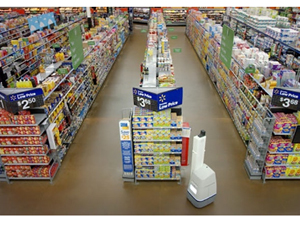



Date:08/11/17
 Wal-Mart Stores Inc is rolling out shelf-scanning robots in more than 50 U.S. stores to replenish inventory faster and save employees time when products run out.
Wal-Mart Stores Inc is rolling out shelf-scanning robots in more than 50 U.S. stores to replenish inventory faster and save employees time when products run out.
The approximately 2-foot (0.61-meter) robots come with a tower that is fitted with cameras that scan aisles to check stock and identify missing and misplaced items, incorrect prices and mislabeling. The robots pass that data to store employees, who then stock the shelves and fix errors.
Out-of-stock items are a big problem for retailers since they miss out on sales every time a shopper cannot find a product on store shelves.
Wal-Mart, the world’s largest retailer has been testing shelf-scanning robots in a handful of stores in Arkansas, Pennsylvania and California.
“If you are running up and down the aisle and you want to decide if we are out of Cheerios or not, a human doesn’t do that job very well, and they don’t like it,” Jeremy King, chief technology officer for Walmart U.S. and e-commerce, told Reuters.
The company said the robots would not replace workers or affect employee headcount in stores.
The robots are 50 percent more productive than their human counterparts and can scan shelves significantly more accurately and three times faster, King said. Store employees only have time to scan shelves about twice a week.
The idea of installing robots to automate retail is not new. Rival Amazon.com Inc uses small Kiva robots in its warehouses to handle picking and packing, saving almost 20 percent in operating expenses.
For Wal-Mart, the move is part of a broader effort to digitize its stores to make shopping faster.
In the past year, it has installed giant “pickup towers” that operate like self-service kiosks and where customers can pick up their online orders.
The company has also speeded up the checkout process by allowing customers to scan their own purchases, and it has digitized operations like pharmacy and financial services in stores.
Wal-Mart has also been testing drones for home delivery, curbside pickup and checking warehouse inventories.
Robots to help stock shelves at more than 50 Walmart stores
 Wal-Mart Stores Inc is rolling out shelf-scanning robots in more than 50 U.S. stores to replenish inventory faster and save employees time when products run out.
Wal-Mart Stores Inc is rolling out shelf-scanning robots in more than 50 U.S. stores to replenish inventory faster and save employees time when products run out.The approximately 2-foot (0.61-meter) robots come with a tower that is fitted with cameras that scan aisles to check stock and identify missing and misplaced items, incorrect prices and mislabeling. The robots pass that data to store employees, who then stock the shelves and fix errors.
Out-of-stock items are a big problem for retailers since they miss out on sales every time a shopper cannot find a product on store shelves.
Wal-Mart, the world’s largest retailer has been testing shelf-scanning robots in a handful of stores in Arkansas, Pennsylvania and California.
“If you are running up and down the aisle and you want to decide if we are out of Cheerios or not, a human doesn’t do that job very well, and they don’t like it,” Jeremy King, chief technology officer for Walmart U.S. and e-commerce, told Reuters.
The company said the robots would not replace workers or affect employee headcount in stores.
The robots are 50 percent more productive than their human counterparts and can scan shelves significantly more accurately and three times faster, King said. Store employees only have time to scan shelves about twice a week.
The idea of installing robots to automate retail is not new. Rival Amazon.com Inc uses small Kiva robots in its warehouses to handle picking and packing, saving almost 20 percent in operating expenses.
For Wal-Mart, the move is part of a broader effort to digitize its stores to make shopping faster.
In the past year, it has installed giant “pickup towers” that operate like self-service kiosks and where customers can pick up their online orders.
The company has also speeded up the checkout process by allowing customers to scan their own purchases, and it has digitized operations like pharmacy and financial services in stores.
Wal-Mart has also been testing drones for home delivery, curbside pickup and checking warehouse inventories.
Views: 457
©ictnews.az. All rights reserved.Similar news
- Justin Timberlake takes stake in Facebook rival MySpace
- Wills and Kate to promote UK tech sector at Hollywood debate
- 35% of American Adults Own a Smartphone
- How does Azerbaijan use plastic cards?
- Imperial College London given £5.9m grant to research smart cities
- Search and Email Still the Most Popular Online Activities
- Nokia to ship Windows Phone in time for holiday sales
- Internet 'may be changing brains'
- Would-be iPhone buyers still face weeks-long waits
- Under pressure, China company scraps Steve Jobs doll
- Jobs was told anti-poaching idea "likely illegal"
- Angelic "Steve Jobs" loves Android in Taiwan TV ad
- Kinect for Windows gesture sensor launched by Microsoft
- Kindle-wielding Amazon dips toes into physical world
- Video game sales fall ahead of PlayStation Vita launch





















